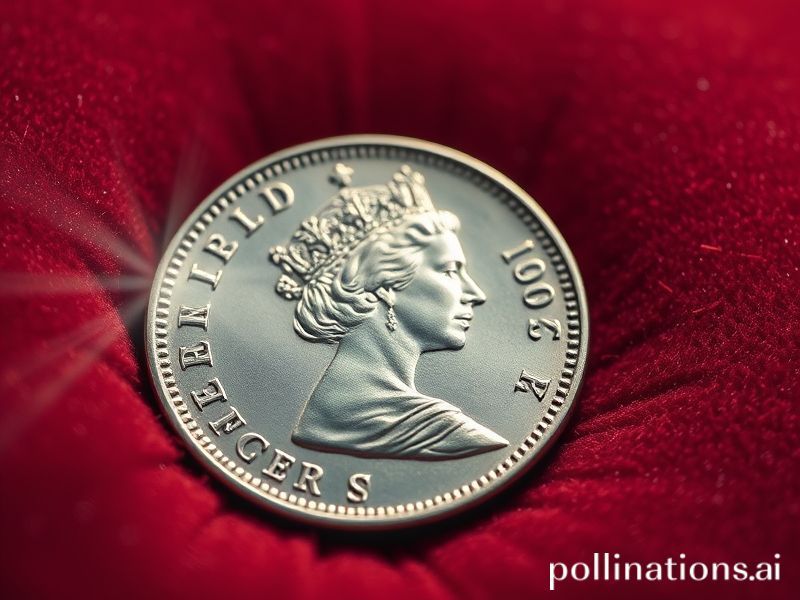Sterling: How Britain’s Antique Currency Still Triggers Global Panic Attacks
Sterling: The Coin That Refuses to Die
London—In a world where Dogecoin millionaires brag on TikTok and the euro keeps apologizing for existing, the pound sterling clings to relevance like a 19th-century duke at a techno rave. Yet this antique currency, stamped with the profile of yet another monarch who never carries cash, still punches above its 1,300-year-old weight class. The reason? Sterling isn’t just money; it’s Britain’s last empire—smaller, colder, and infinitely more polite than the original, but still capable of ruining your mortgage in 47 different time zones.
From the trading floors of Singapore to the back offices of Lagos, sterling is the moody guest at the global potluck: it arrives late, brings an obscure dish nobody asked for (gilts, anyone?), then somehow ends up dictating the playlist. When the Bank of England clears its throat, carry-trade addicts in Reykjavik reach for the aspirin. When Liz Truss tried her brief Thatcher cosplay, pension funds from Toronto to Tokyo discovered they were holding the same flaming bag of derivatives. The pound’s tantrums are so reliably catastrophic that hedge funds now treat them as seasonal weather events, like monsoons or Eurovision.
Sterling’s international mystique rests on a trio of myths the British themselves half-believe. First, that the City of London is still “the world’s financial capital” rather than a genteel casino where Russian oligarchs launder reputations and American banks launder everything else. Second, that a currency once backed by dreadnoughts and opium can bluff its way through the 21st century on sheer nostalgia. Third, that the pound is somehow “safe” because the worst has already happened—Brexit, austerity, a prime minister who lasted less than a lettuce. (The lettuce, for the record, outperformed gilts that week.)
Emerging markets know better. Ghana, once told by the IMF to model its cedi on the pound’s “sound fundamentals,” now watches sterling wobble and feels the schadenfreude of a student whose drunk professor just face-planted into the whiteboard. Argentina, veteran of nine sovereign defaults, keeps a framed chart of GBP/USD in the finance ministry as a morale booster: “See? Even the ex-colonial overlords can’t balance a checkbook.” Meanwhile, Nigerian bureaux de change quote sterling with the same amused pity they reserve for Lebanese lira: “Yes, we’ll take it, but don’t expect change in anything bigger than a fiver.”
Central banks, those joyless accountants of apocalypse, still hold sterling as a reserve currency for the same reason people keep a Swiss Army knife in the drawer: not because it’s essential, but because throwing it away feels more dangerous than keeping it. The IMF lists the pound at 4.9% of global reserves, just behind the yen and well ahead of the Canadian dollar, which is basically maple-scented Monopoly money. This gives Britain veto power in crises it usually helped create, like a firefighter-arsonist who demands a pension for showing up.
And yet, perversely, sterling endures because it is flawed. The euro is too virtuous, the dollar too weaponized, crypto too evangelical. The pound, by contrast, is the international system’s designated screw-up: erratic, theatrical, forever promising reform while staggering out of the pub at closing time. In a universe of algorithmic certainty, sterling is gloriously human—capable of collapsing 5% because a minister used the wrong fork at dinner. Traders pretend to be appalled, but secretly they adore the drama; it reassures them that someone, somewhere, still believes economics is run by people rather than code.
Conclusion: Sterling will never again rule the waves, but it will continue to make waves—mostly by capsizing smaller boats. Its value lies not in the metal or paper, but in the stories we tell about decline, resilience, and the comic stubbornness of nations that mistake nostalgia for strategy. As long as there are tourists to fleece, oligarchs to flatter, and journalists to mock, the pound will remain the world’s favorite unreliable narrator. And when the last coin drops, historians will note that sterling’s true legacy wasn’t financial at all—it was the greatest black comedy ever minted.







